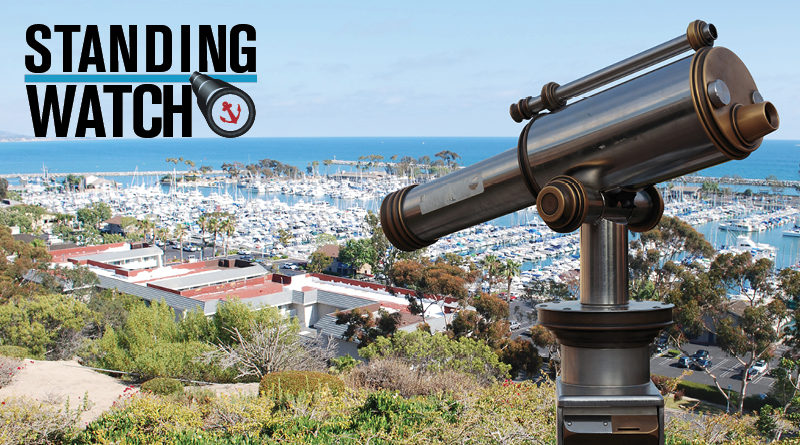Boating Insecurity: Can engine cut-off switches minimize accidents?
A proposed Coast Guard rule in 2011 sought direction to promote safety appears to suffer from a lack of decisive action.
NATIONWIDE — Various members of the recreational boating industry will be in Washington, D.C. for the American Boating Congress, which takes place on Capitol Hill, May 9-11. One of the policy issues expected to be fleshed out during the legislative and lobby conference is boating safety – specifically the mandatory wear of engine cut-off devices.
The concept of engine cut-off devices was introduced to recreational boaters in 2011, when the U.S. Coast Guard issued a federal rulemaking on the installation and use of such switches. Coast Guard officials specifically sought public comment on a proposal to require engine cut-off switches on recreational boats of 26 feet and smaller.
“The Coast Guard seeks comment on … whether casualties likely would have been prevented by the use of engine cut-off switches,” the proposed rulemaking document stated.
A policy flyer issued by the National Marine Manufacturers Association (NMMA) in advance of the American Boating Congress stated Coast Guard officials have not acted on its proposed rulemaking since introducing it to the public in June 2011.
“The USCG has yet to take action after issuing a rulemaking,” the NMMA policy flyer stated. “The National Boating Safety Advisory Council has issued several resolutions supporting mandatory wear of engine cut-off devices. Manufacturers of new boats and engines already install engine cutoff switches as a standard safety feature – there is no additional cost to consumers.”
The Log researched documents on the Federal Register website and found the 2011 proposed rulemaking. Other documents posted in the seven years since have mentioned engine cut-off devices, but there is no evidence of definitive action taken by the Coast Guard or any other federal agency on the matter.
Coast Guard officials, to be fair, did state in the rulemaking notice they had no intention to hold a public meeting on the matter. The agency, instead, was merely seeking public input on engine cut-off switches.
Public records show the agency received 24 comments on the proposal, all submitted before the comment period closed on Sept. 6, 2011.
Phillip Wolfson, a member of the U.S. Coast Guard Auxiliary, expressed his support of the proposed rule.
“These engine cut-off switch installations should be made mandatory for all power operated craft, even those with enclosed helm areas,” Wolfson wrote. “It should also be made mandatory that the boat operator have the lanyard securely attached either to his PFD, wrist or other secure area while operating the boat.”
Another member of the public opposed the proposed rulemaking, calling it “a fatuous concept.”
“While it would appear good, just how one could manage a boat with such an idea boggles the mind. In a hard blow with the outboard doing its job how is a sailor to manage the boat tethered to such a line,” Noel Nicholls wrote in his comment.
Someone who identified himself as a sheriff stated engine cut-off devices would save lives.
“During my tenure as a Sheriff patrolling waterways and rivers in California I have had numerous cases where fishermen were ejected from their small boat [26 feet and smaller]. The results were always fatal. In some cases because they were not wearing a PFD or they were a victim of the elements or their own poor health. Instant submersion in cold water produced heart failure,” Gary Martin stated in his comment. “In larger high speed boats I have seen the engine shut off switch save lives, when the driver was thrown away from the helm.”
Overall the comments were split, with several people voicing their respective oppositions to the proposed rulemaking.
The Log reached out to a Coast Guard official to determine whether the opposing comments were substantive enough to prevent the agency from pursuing its proposal in earnest. Our attempts for additional insight have not yet been successful.
The question remains, however, whether engine cut-off devices should be the norm for smaller recreational boats. NMMA, for example, clearly appears to be in favor of making such a device available to recreational boaters.
Coast Guard officials, in the proposed rulemaking, stated they reviewed a report on preventable casualties in recreational boating and determined a common cause of deaths in such situations involved the absence of someone at the helm of a vessel.
“An operator may be ejected or fall overboard from the recreational vessel if, for example, the vessel hits a large wake, turns too sharply, or collides with another vessel or object in the water. When this happens, the recreational vessel will typically continue to operate, usually moving in circles, until it runs out of fuel, runs aground, collides with another object, or is disabled,” the proposed rulemaking stated. “Because a recreational vessel normally maintains the speed at which it is operating when the operator is ejected or falls overboard, or when the controls are otherwise unattended, it is often difficult for any persons ejected from the vessel or already in the water to swim out of the vessel’s path, which may lead to one or more persons being struck by the vessel, a propeller, or a lower unit of the outboard or sterndrive.
“A ‘runaway’ recreational vessel may also cause damage by striking vessels or other property,” the proposed rulemaking stated.


